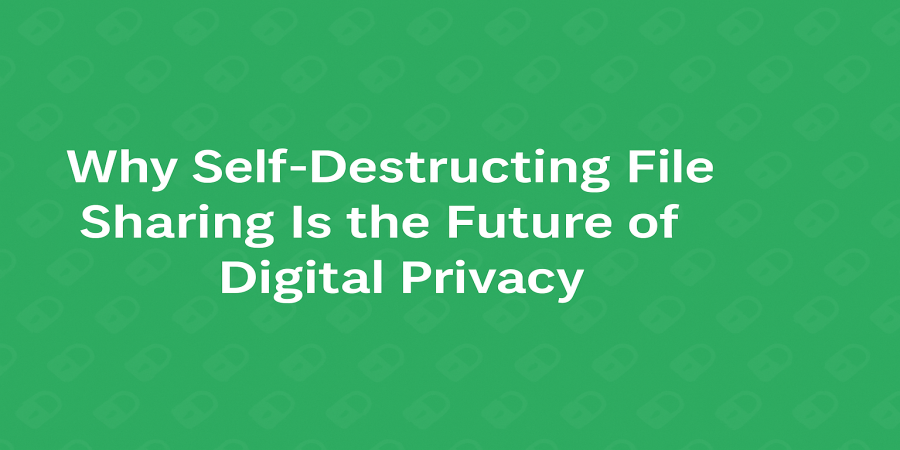

5 Times You Should Use Self-Destructing Files Instead of Email Attachments
In today’s digital world, file sharing is second nature. We send resumes, contracts, photos, passwords, and reports through email without a second thought. But here’s the problem: email attachments are permanent, unsecured, and dangerously easy to forward or expose.
That’s where self-destructing file sharing comes in. Tools like TransFilex offer a more secure, privacy-focused alternative by allowing files to vanish after being viewed or after a set time limit. It's like sending a message that deletes itself—but for files.
If you're wondering when to use this smarter method, here are five real-life scenarios where self-destructing files beat traditional email attachments every time.
1. When Sharing Legal Contracts
Why it matters: Legal documents often contain sensitive information: personal addresses, business terms, or signatures. When sent as email attachments, they sit in inboxes indefinitely and are prone to being forwarded, downloaded, or even accessed by unauthorized parties if the email is hacked.
Real-life scenario: A lawyer sends a draft partnership agreement to a client for review. Instead of attaching a PDF to an email, they use TransFilex to send a link that expires after 48 hours or after a single view. Once opened, the document deletes itself, ensuring there’s no digital paper trail.
Pro tip: Set files to self-destruct after a single download for added legal confidentiality.
The risk with email: Email is forever. Even if you delete the message, the recipient may still have a copy—or worse, someone else might.
2. When Sharing Passwords or Access Credentials
Why it matters: Passwords should never be shared via email. Period. It’s one of the top mistakes that leads to unauthorized access and account takeovers.
Real-life scenario: A freelancer is hired by a business owner to manage their website. The business owner needs to share the admin login credentials for their hosting account. Instead of sending a plaintext email (a big no-no), they upload the credentials in a text file to TransFilex, set the link to expire after one view, and send it via a messaging app.
Pro tip: For one-time credentials, use a strong temporary password and enable two-factor authentication afterward.
The risk with email: Emails can be intercepted or accessed later. Even if you trust the recipient, you can’t control what happens next.
3. When Distributing HR Files or Employment Documents
Why it matters: Human Resources departments handle everything from employment offers to payroll data and disciplinary records—all of which are highly sensitive. Sending these as email attachments creates a trail that can be accidentally leaked or misfiled.
Real-life scenario: An HR manager sends a new employee their contract, tax forms, and ID verification documents. With TransFilex, these documents are shared through encrypted links that expire in 72 hours. This ensures only the intended recipient has temporary access, and nothing is left behind in corporate inboxes or personal email accounts.
Pro tip: Label files clearly with date and purpose, and remind recipients to download within the set timeframe.
The risk with email: Old email threads are easily searchable. Months later, an unauthorized person may still find and download confidential employee files.
4. When Handling Non-Disclosure Agreements (NDAs)
Why it matters: NDAs are meant to protect sensitive conversations and intellectual property. Ironically, sending them as a permanent email attachment can create risks that contradict the very purpose of the NDA.
Real-life scenario: A startup founder shares an NDA with a potential investor. Using TransFilex, the NDA is shared via a self-destructing link set to expire after 24 hours. The founder even receives a notification once the document is opened, ensuring transparency.
Pro tip: Always pair NDAs with an expiration notice and follow up with verbal confirmation or a secure call.
The risk with email: An outdated or unsigned version of the NDA might resurface in someone’s inbox months later, causing confusion or legal headaches.
5. When Sending Personal or Sensitive Documents
Why it matters: Whether you're sending a photo ID, financial statement, or personal note, your private documents deserve short-lived exposure, not indefinite availability.
Real-life scenario: A user needs to provide proof of residency for a government process. They scan a utility bill and upload it to TransFilex with a 1-hour expiration timer. The link is sent to the official’s secure email, ensuring that the document disappears quickly after use.
Pro tip: Add watermarks to personal files to discourage misuse.
The risk with email: If your email is ever compromised, that document could be accessed by the wrong person.
The Bottom Line
Email is great for many things, but secure file sharing isn't one of them. Once you hit "send," you're handing over control. You can’t unsend an attachment. You can’t stop someone from forwarding it. And you definitely can’t track who viewed it or when.
With self-destructing file sharing platforms like TransFilex, you regain control. You decide who sees your file, how long it exists, and what happens after it’s opened. It’s a smarter, safer way to share.
Key benefits of using TransFilex over email attachments:
-
Files vanish after being viewed or after a time limit
-
Military-grade encryption for both uploads and downloads
-
No lingering inbox clutter
-
Optional access tracking and alerts
-
No need for recipients to sign up
As cyber risks continue to rise and privacy becomes a non-negotiable, self-destructing files are more than just a nice feature—they're a necessity.
Final Thoughts
Whether you're in business, freelancing, HR, law, or just protecting your personal documents, think twice before attaching that file to your next email. Ask yourself:
-
Do I want this file to exist forever?
-
Can I trust every hand it might pass through?
-
What happens if it gets forwarded, saved, or leaked?
If you’re not okay with the answers, it’s time to switch to a smarter solution.
Try TransFilex today and make your next file transfer a private one.
Popular articles

Apr 06, 2025 08:29 AM

Apr 06, 2025 08:26 AM

Apr 06, 2025 08:22 AM
Categories
Comments (0)